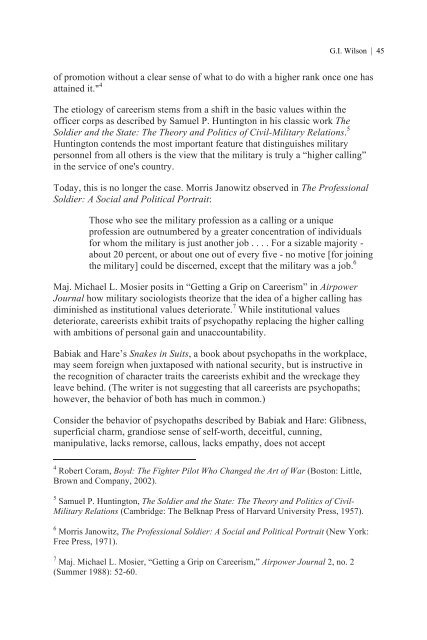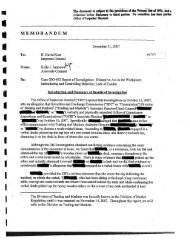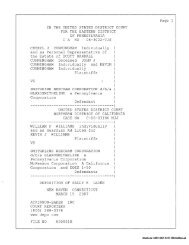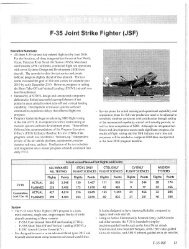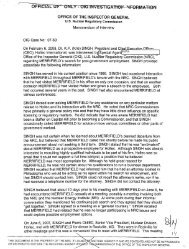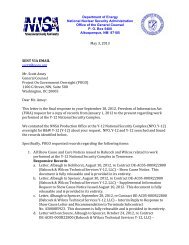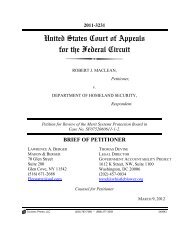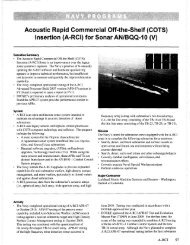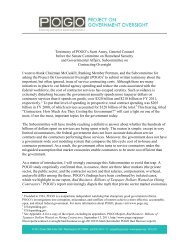The Pentagon Labyrinth
The Pentagon Labyrinth
The Pentagon Labyrinth
You also want an ePaper? Increase the reach of your titles
YUMPU automatically turns print PDFs into web optimized ePapers that Google loves.
of promotion without a clear sense of what to do with a higher rank once one has<br />
attained it." 4<br />
<strong>The</strong> etiology of careerism stems from a shift in the basic values within the<br />
officer corps as described by Samuel P. Huntington in his classic work <strong>The</strong><br />
Soldier and the State: <strong>The</strong> <strong>The</strong>ory and Politics of Civil-Military Relations. 5<br />
Huntington contends the most important feature that distinguishes military<br />
personnel from all others is the view that the military is truly a “higher calling”<br />
in the service of one's country.<br />
Today, this is no longer the case. Morris Janowitz observed in <strong>The</strong> Professional<br />
Soldier: A Social and Political Portrait:<br />
Those who see the military profession as a calling or a unique<br />
profession are outnumbered by a greater concentration of individuals<br />
for whom the military is just another job . . . . For a sizable majority -<br />
about 20 percent, or about one out of every five - no motive [for joining<br />
the military] could be discerned, except that the military was a job. 6<br />
Maj. Michael L. Mosier posits in “Getting a Grip on Careerism” in Airpower<br />
Journal how military sociologists theorize that the idea of a higher calling has<br />
diminished as institutional values deteriorate. 7 While institutional values<br />
deteriorate, careerists exhibit traits of psychopathy replacing the higher calling<br />
with ambitions of personal gain and unaccountability.<br />
Babiak and Hare’s Snakes in Suits, a book about psychopaths in the workplace,<br />
may seem foreign when juxtaposed with national security, but is instructive in<br />
the recognition of character traits the careerists exhibit and the wreckage they<br />
leave behind. (<strong>The</strong> writer is not suggesting that all careerists are psychopaths;<br />
however, the behavior of both has much in common.)<br />
Consider the behavior of psychopaths described by Babiak and Hare: Glibness,<br />
superficial charm, grandiose sense of self-worth, deceitful, cunning,<br />
manipulative, lacks remorse, callous, lacks empathy, does not accept<br />
4 Robert Coram, Boyd: <strong>The</strong> Fighter Pilot Who Changed the Art of War (Boston: Little,<br />
Brown and Company, 2002).<br />
5 Samuel P. Huntington, <strong>The</strong> Soldier and the State: <strong>The</strong> <strong>The</strong>ory and Politics of Civil-<br />
Military Relations (Cambridge: <strong>The</strong> Belknap Press of Harvard University Press, 1957).<br />
6 Morris Janowitz, <strong>The</strong> Professional Soldier: A Social and Political Portrait (New York:<br />
Free Press, 1971).<br />
7 Maj. Michael L. Mosier, “Getting a Grip on Careerism,” Airpower Journal 2, no. 2<br />
(Summer 1988): 52-60.<br />
G.I. Wilson | 45


